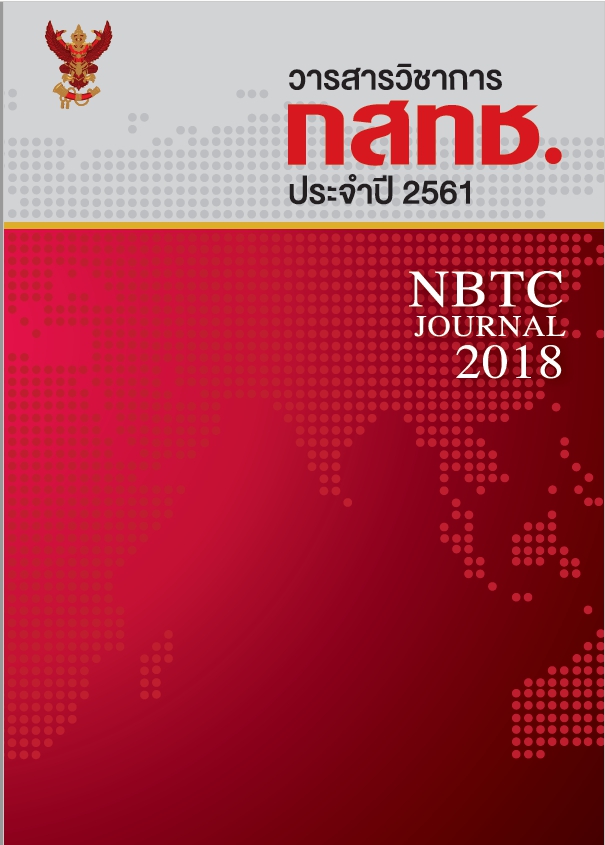Broadcasting License Framework and Administration in Conjunction with Compliance in Thailand
Keywords:
Law, License framework and administration, Law and regulatory complianceAbstract
Thailand broadcasting regulator has fully embraced as a result of the announcement of the Frequency Allocation and Sound Broadcasting, Television, and Telecommunications Regulation Act B.E. 2553. Presence of the regulator (the National Broadcasting and Telecommunications Commission (NBTC) together with the Office of NBTC) has been leading to stakeholders’ expectations towards their performance. In the view of stakeholders, it seems there is a gap between their expectations and what they perceive. It could possibly be considered that root causes are from complexity of law and regulations in conjunction with regulatory approaches and administration, which could overwhelm the work of NBCT. This could also influence the immense demand on regulatory resources, as well as efficiency of the system as a whole.
The international trend in licensing presents more flexibility to accommodate future technological changes; simplify the number of license categories; reduce administrative burdens; and foster technology neutrality. On a contrary, Thailand legal structure and regulations seem not very much in line with international trend. There is a huge number of Thailand broadcasting licenses by August 2018. As such, some recommendations are proposed for consideration in order to better fulfill stakeholders’ expectation as well as to help boost up regulatory efficiency.
References
พระราชบัญญัติองค์กรจัดสรรคลื่นความถี่และกำกับการประกอบกิจการวิทยุกระจายเสียง วิทยุโทรทัศน์ และกิจการโทรคมนาคม
พ.ศ. 2553. (2553, 19 ธันวาคม). ราชกิจจานุเบกษา. เล่ม 127 ตอนที่ 78 ก.
พระราชบัญญัติองค์กรจัดสรรคลื่นความถี่และกำกับการประกอบกิจการวิทยุกระจายเสียง วิทยุโทรทัศน์ และกิจการโทรคมนาคม
(ฉบับที่ 2) พ.ศ. 2560. (2560, 22 มิถุนายน). ราชกิจจานุเบกษา. เล่ม 134 ตอนที่ 65 ก.
พระราชบัญญัติการประกอบกิจการกระจายเสียงและกิจการโทรทัศน์ พ.ศ. 2551. (2551, 4 มีนาคม). ราชกิจจานุเบกษา. เล่ม 125
ตอนที่ 42ก.
พระราชบัญญัติวิทยุคมนาคม พ.ศ. 2498. (2498, 4 มีนาคม). ราชกิจจานุเบกษา. เล่ม 125 ตอนที่ 42ก.
ประกาศคณะกรรมการกิจการกระจายเสียง กิจการโทรทัศน์ และกิจการโทรคมนาคมแห่งชาติ เรื่อง กำหนดลักษณะและประเภทของ
กิจการกระจายเสียงและกิจการโทรทัศน์. (2555, 20 กรกฎาคม). ราชกิจจานุเบกษา. เล่ม 129 ตอนพิเศษ 126 ง.
สำนักงานคณะกรรมการกิจการกระจายเสียง กิจการโทรทัศน์ และกิจการโทรคมนาคมแห่งชาติ. (2556). เงื่อนไขแนบท้ายใบ
อนุญาตประกอบกิจการกระจายเสียงหรือโทรทัศน์เพื่อให้บริการโครงข่ายโทรทัศน์ที่ใช้คลื่นความถี่ภาคพื้นดินในระบบดิจิตอล
ระดับชาติ. กรุงเทพฯ
สำนักงานคณะกรรมการกิจการกระจายเสียง กิจการโทรทัศน์ และกิจการโทรคมนาคมแห่งชาติ. (2558). เงื่อนไขแนบท้ายใบ
อนุญาตให้ใช้คลื่นความถี่และประกอบกิจการโทรทัศน์ เพื่อให้บริการโทรทัศน์ภาคพื้นดินในระบบดิจิตอล ประเภทบริการทาง
ธุรกิจระดับชาติ หมวดหมู่ทั่วไปแบบความคมชัดสูง. กรุงเทพฯ
สำนักงานคณะกรรมการกิจการกระจายเสียง กิจการโทรทัศน์ และกิจการโทรคมนาคมแห่งชาติ. (2558). เงื่อนไขแนบท้ายใบ
อนุญาตประกอบกิจการกระจายเสียงหรือโทรทัศน์เพื่อให้บริการสิ่งอำนวยความสะดวกด้านกระจายเสียงหรือโทรทัศน์. กรุงเทพฯ
สำนักงานคณะกรรมการกิจการกระจายเสียง กิจการโทรทัศน์ และกิจการโทรคมนาคมแห่งชาติ. (2558). เงื่อนไขแนบท้ายการ
อนุญาตทดลองประกอบกิจการกระจายเสียง. กรุงเทพฯ
สหภาพโทรคมนาคมระหว่างประเทศ. (2554). Report on Licensing Administration and Compliance. สหภาพโทรคมนาคมระหว่างประเทศ และสำนักงานคณะกรรมการกิจการกระจายเสียง กิจการโทรทัศน์ และกิจการโทรคมนาคมแห่งชาติ. ม.ป.ท.:ม.ป.พ.
Downloads
Published
How to Cite
Issue
Section
License
The Office of the NBTC holds the copyright of articles appearing in the journal. The Office of the NBTC allows the public or individuals to distribute, copy, or republish the work under a Creative Commons license (CC), with attribution (BY), No Derivatives (ND) and NonCommercial (NC); unless written permission is received from the Office of the NBTC.
Text, tables, and figures that appear in articles accepted for publication in this journal are personal opinion and responsibility of the author, and not binding on the NBTC and the Office of the NBTC. In case of errors, each author is solely responsible for their own article, and not concerning the NBTC and the NBTC Office in any way.



